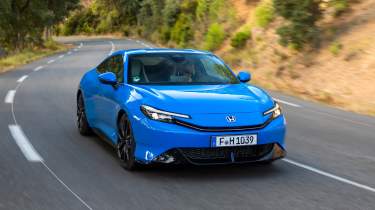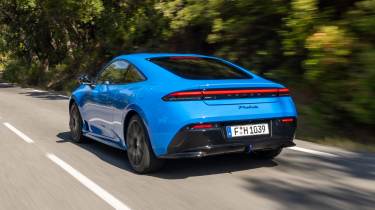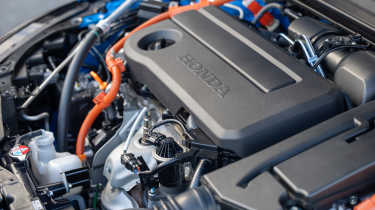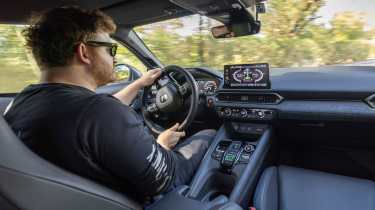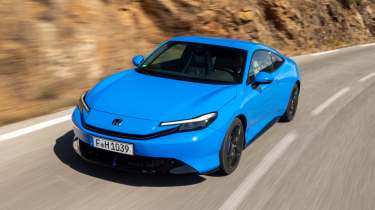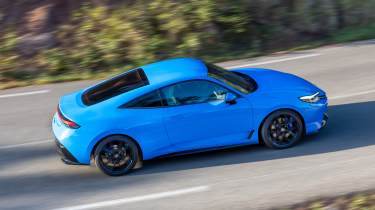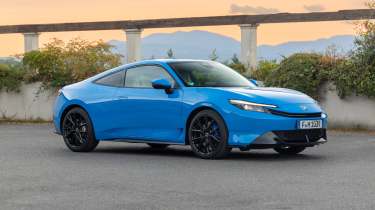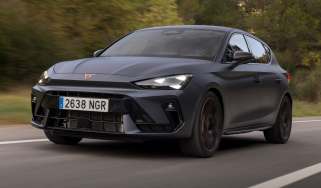New Honda Prelude review – the Audi TT alternative you’ve been looking for?
The Honda Prelude returns after 25 years, with Type R suspension and glider-inspired styling
Launching an all-new coupé in 2025 is a brave move. Nevermind discretionary cars with slender use cases, the day-to-day stuff simply isn’t selling in the volumes carmakers would like. So why isn’t Honda nervous about introducing the Prelude?
Firstly, it doesn’t intend to sell that many, with Honda UK having plans to shift fewer than 1000 examples over the next two years. Volume was never the point, rather the Prelude serves as an object of desire, at the head of Honda’s range, where once the Civic Type R and NSX sat, though how fit it is to fill their shoes is up for debate. Secondly, because these kinds of cars don’t trouble the sales charts, pickings are slim. So maybe serial Audi TT buyers looking for a new alternative now their beloved Golf based coupé has gone, might look to the handsome Prelude with curiosity.
At £40,995 it’s TT-alike in its pricing too and with (just) 181bhp and 232lb ft from its 2-litre hybrid powertrain, TT-alike in its performance offering too. Honda says this car’s main (though far from direct) ‘rival’ is BMW’s 220i, which is cheaper (£39,070) and is more powerful (184bhp).
It’s a handsome thing, the Prelude, so it’s definitely worth a look in the literal sense. This is a car in visual contrast to the Predator-faced FK8 Type R of a few years ago and you’d be right in wondering if a dainty minimalistic coupé is up to the job of filling the shoes of a supercar or a touring car for the road. Nonetheless, it is pretty and elegant from the right angles, with great proportions and considered lines, its styling inside and out inspired by engineless gliders.
More reviews
Group tests
- Lotus Emira Turbo SE v Alpine A110 GTS – two of the last surviving mid-engined sports cars
- Alpine A290 v Alpine A110 – how much DNA do they really share?
- Ariel Atom 4R v Ariel Nomad 2 – is grip more fun than slip?
- Ariel Atom 4R v Caterham Seven ‘evo25’: power-to-weight heroes go head-to-head
- Ariel Atom 4 v Caterham Seven 310R v Lotus Elise Cup 250
- £200,000 supercar shoot-out: AMG v Aston Martin v Maserati v McLaren
- Audi Quattro, RS2 and RS3: five-cylinder icons head-to-head
- Who makes the best GT car? Aston Martin v Bentley v Maserati
- Caterham Super Seven 600 v Super Seven 2000
- Corvette Stingray v Porsche Cayman GTS v Audi R8 RWD
In-depth reviews
- Abarth 600e 2025 review – Italy gives the Alpine A290 something to worry about
- Alpine A110 R Ultime review – Ferrari money for a four-cylinder, but it might be worth it
- Alpine A110 review – the sports car Lotus should be building
- Aston Martin Vantage 2025 review – a thrilling Mercedes-AMG GT and 911 Turbo S alternative
- Used Audi RS2 (1994) review – an unsung '90s hero you can own for £40k
- Bentley Flying Spur review – the ultimate driver’s limousine
Long term tests
- Abarth 695C Turismo Fast Fleet test – living with the charming Italian hatch
- Alfa Romeo Giulia Veloce long term test – can Italy beat Germany?
- Alpina B10: Alpina B10: end of term report
- Aston Martin Vantage (2006) Fast Fleet test – living with a £30k V8 Aston
- Caterham Seven evo25 Fast Fleet test – living with a track car for the road
- Caterham Seven evo Edition revealed – bespoke 420R joins the Fast Fleet
- Cupra Leon 300 Fast Fleet test – living with Spain's 300bhp hot hatch
- Cupra Ateca VZN Fast Fleet test – four months with Cupra's hot crossover
- Cupra Leon Estate 310 4Drive Fast Fleet test – living with the 306bhp hot estate
- Ford Mustang GT
Review
- New Bentley Batur 2023 review – can it possibly be worth £1.65m?
- 2023 Chevrolet Corvette C8 Z06 review – the American 911 GT3?
- BBR Supercharged Mazda MX-5 (ND) 2023 review – tuned 250bhp roadster driven
- MG4 Trophy 2023 review
Reviews
- Abarth 695 75 Anniversario edition 2024 review – a fitting send-off for Abarth’s hot supermini?
- Abarth 500e 2023 review
- AC Cobra 378 Superblower MkIV 2021 review – another V8 Cobra, but with a GM heart this time
- Acura Integra Type S 2024 review – a Honda Civic Type R with added restraint
- Alfa Romeo Giulia review – get one while you still can
- Alfa Romeo 33 Stradale 2025 review – a rare Italian jewel beyond compare
- Alfa Romeo SZ: history, review and specs of an icon
> Used Honda NSX (1999 - 2006) review: Japan's original supercar
Under the skin there is Civic Type R-derived suspension, including the hot hatches dual-axis front struts and springs and adaptive dampers mounted with extra caster at the front, increasing negative camber the more lock you wind on but avoiding deflection at the straight ahead.
The damper housing is Civic Type R, with softer internals, which Honda reckons splits the difference between the normal Civic and the Type R in terms of compliance. The rear suspension is a multi-link set-up.
The e-HEV powertrain consists of a free-breathing 2-litre four-cylinder petrol engine combined with dual electric motors delivering peak outputs of 181bhp and 232lb ft. No, that doesn’t sound like a lot (though that torque is delivered instantly thanks to the electric motors). Nor the 0-62mph time of 8.2sec, nor the 116mph top speed. The Honda bods nonetheless tell us that the figures don’t tell the whole story – ‘you have to drive this car’. We’ll get to that.
How power goes from engine and motor to front wheels is a whole other thing. The electric motor actually drives the wheels for most of the time, fed by a 1.1kWh 72-cell battery, while the 2-litre engine charges the battery and can drive the wheels when you’re asking the car for everything it has – that last bit is what makes the Prelude a ‘full hybrid’ and not a range extender EV.
Also in the mix is the CVT. Don’t panic, Honda’s new S+ shift system simulates a proper eight-speed transmission with wheel-mounted paddles using software to massage the powertrain, drivetrain and regenerative braking system. Pressing the prominent S+ button gives you the ‘gears’ and switches the power percentage dial on the digital dash, to a rev counter. There are three basic driving modes - GT, Sport and Comfort - dictating powertrain steering, suspension and engine sound parameters. Individual mode allows independent control of all.
So what’s the Prelude actually like to drive? You feel the Type R inspired hardware almost instantly. There’s a sophistication to how the Prelude bobs along an uneven street. It doesn’t isolate what’s happening beneath you, with every rise and fall of each wheel clearly expressed, but it’s managed and communicative rather than shouty and distracting.
Pressing on, with the car switched to Sport which adds weight to the steering rather than feel, you relish the feeling as each of the four corners tenses and relaxes as vertical loads build and recede. It feels expensive and capable, comfortable and compliant yet controlled. It's perhaps too capable, requiring real pace to find the point at which the fundamentally neutral balance presents itself.
Turn-in is keen and as advertised gets keener with added lock. Carry too much speed into the heart of a corner and it will understeer but rarely untidily so. On the faster sweeping paving of the Route Napoleon test route, I could use the brakes to activate the rear of the car, the battery’s mass almost helping to position it with attitude on turn in.
In these moments it's a honey, the Active Handling Assist software braking the inside wheels to tighten your line. Even the Brembo brakes give confidence, with good modulation and a sturdy end to the pedal travel and little pollution in feel from the seven-setting(!) regenerative system.
The S+ shift system isn’t all the way there, though. It works well in the round, though lacking a proper manual-only mode means you're constantly subject to its overeagerness to downshift. The ‘shifts’ are quick enough, with a ‘kick’ from the e-motors accompanying each change. There's a dissonance though and you’re constantly aware it's an imitation. There isn’t that feeling of mechanical discourse you get in a car with real cogs between your controls, the motor and the wheels.
Weirdly, the Hyundai Ioniq 5 N recreates a traditional engine-gearbox-wheels dynamic more believably. Nonetheless we all owe the S+ system a debt of gratitude for saving us and the Prelude from slurring CVT hell as well as it does and await version 2 with anticipation.
The powertrain itself does fall short of thrilling. Some said it's not powerful enough and too slow. I counter by claiming the power and performance would be acceptable, if it were at all stimulating in the process.
It’s almost as if the clever way it delivers its potency low down works against it, especially in a car from a firm so famed for power plants that didn’t just relish revs but demanded them to deliver their full effort. Instead this is a car with not a lot to give, but gives what it has low down, leaving a void where once there were revs and a pinging redline.
You naturally tend towards working with the groundswell of electrified torque to reach the car’s happy place – a seven-tenths flow if you will. Maximum attack, using all the revs, feels a bit alien, near abusive, like you’re whipping an overworked mule. And that feels alien in a small sporty Honda.
On the one hand that isn’t fair. The Prelude doesn’t present as a Type R just as a BMW 220 never makes play as an M2. It’s a car that neither falters nor excels if your expectations of the driving experience are based on how it looks – subtle and enjoyable, short of extreme. On that basis the TT faithful ought to find it appealing, though they’ll be disappointed by the Prelude’s interior fit and finish, which while fine in isolation, isn’t a patch on the high watermark for Audi that was the last TT.
Then there is the consideration that Honda is positioning the Prelude as a ‘halo’ model to pick up where the outgoing Type R and the last NSX supercar left off. Combine that with the fact that there is Type R magic in the mix that teases you – a chassis that’s just begging for a powertrain with a willingness and intensity to partner it – and suddenly wishing the Prelude had more to give isn’t so unreasonable.
For now the Prelude offers style and chassis substance, if very little in terms of thrills from its powertrain. Fingers crossed for a Type R.
Prices and rivals
The Prelude will start from £40,995 when orders open at the beginning of November, with deliveries starting in 2026. Just 600 are earmarked for UK dealers over the coming two years and Honda is confident demand will outstrip supply.
Honda’s stated target is the £39,070 BMW 220i M Sport coupé and beyond that, there really aren’t many other small coupés at this price point. If Toyota’s GR86 were still on sale, the justification of buying a Prelude instead would be very difficult indeed.
It still is compared to used GR86s, if truth be told, though the Prelude’s full hatchback makes it more practical. No, the Prelude is Honda’s Audi TT – based on a hatchback, trading mostly on style, taking as read the Prelude’s fancy suspension. So a nearly new TT would be worth a look too.

